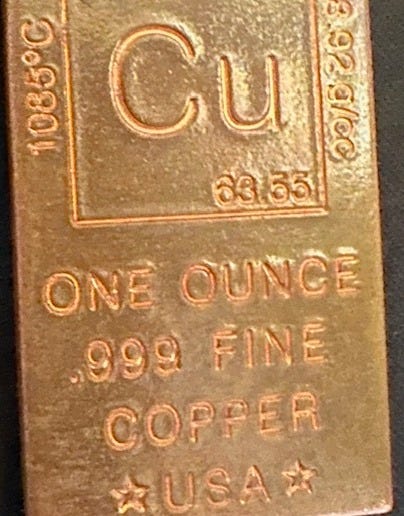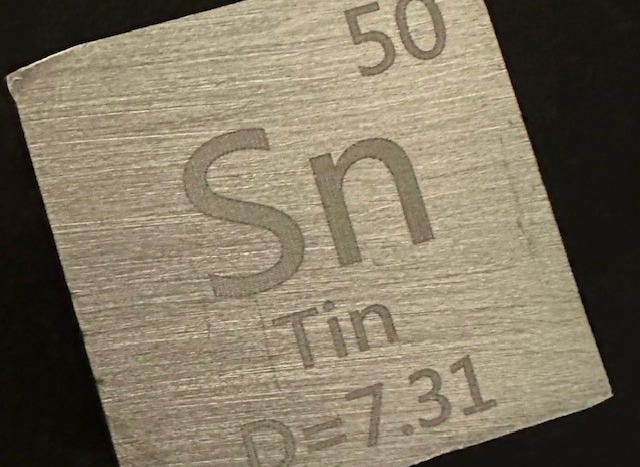M&Ms: Become Bronze, Become Tough
The benefits of becoming a multidisciplinary thinker.
Charlie Munger once said, “I am no prodigy, no genius, and yet if you look at my life, I was able to obtain prodigious results out of it.”
Charlie then proceeded to attribute his prodigious success in business, investing, relationships, and life to his multidisciplinary thinking.
But what does it mean to become multidisciplinary?
It may sound overwhelming, but in Charlie's own words, becoming multidisciplinary simply means "gaining at least entry-level knowledge in all the various fields and using that all the time." I equate this to taking the 101s and 102s of college classes, but in all the different majors, and finding use for the ideas.
When written like that, it sounds so simple. And it is.
But in Charlie’s own words, “so many people either won't do it or won't take it seriously enough.”
But first, Peter Kaufman, Charlie Munger's book editor, mentee, and a billionaire himself (although I have never seen him brag about his billions), once said:
"The beauty of deriving things in a multidisciplinary way [is that] you can't be wrong! When you see something line up [across disciplines], it is like three bars on a slot machine at the casino. Boy, did you hit the jackpot!"
To illustrate this "multidisciplinary Jackpot" idea, I will steal an example from Kaufman himself.
Kaufman once told a crowd to take copper:
We learn in the chemistry discipline that copper has a 3.0 hardness on the Mohs scale of hardness. Copper, by itself, has some desirable properties, like rust resistance, but as the Mohs scale tells us, it is not very tough. That Mohs scale of hardness goes up to 10. Baby powder is a 1, and Diamond is a 10. By the way, this rust resistance property of copper is a big reason copper is used for pipes that carry drinking water these days.
But back to the example, after you have some copper, Kaufman says to take some tin:
Tin is an even less special metal than Copper. I can scratch my tin bar with my nails. On that Mohs hardness scale, tin comes in at 1.5. But it turns out that these two metals, copper and tin, for some reason or another, are not really found anywhere near each other in nature. So you'll have to go out looking for them in different places to find them.
But a few thousand years ago, an ancestor of ours had the bright idea of finding copper and tin and then melting the two together.
It turns out that when you melt Copper and Tin together, you get Bronze. Yes, the very same Bronze that spawned the Bronze Age. Bronze is also the very same stuff that comes after Gold and Silver in medal ceremonies.
Bronze might mean third place in the Olympics, but it turns out that bronze is a pretty special metal that has a lot of desirable properties. Here is what the Encyclopedia Britannica has to say about Bronze:
"Bronze is harder than copper as a result of alloying that metal with tin or other metals. Bronze is also more fusible (i.e., more readily melted) and is hence easier to cast. It is harder than pure iron and far more resistant to corrosion.
The substitution of iron for Bronze in tools and weapons from about 1000 BCE was the result of the abundance of iron compared with copper and tin rather than any inherent advantages of iron."
But here is the kicker: Kaufman says depending on how you mix Copper and Tin, you don't get the 1.5 hardness of tin and the 3.0 hardness of copper divided by 2, which the math discipline tells us we ought to expect about a 2.25 hardness on the Mohs scale (1.5+2.5=4.5, then divided by 2 it is 2.25).
But instead, with Bronze on the Mohs scale, we get a hardness of 6. This defies logic.
And as Britannica tells us, Bronze was used in armor, and it is tougher than iron and even tougher than steel.
This extra hardness, which seems to pop out of thin air when you mix these metals together, is known as an emergent property in chemistry.
But if you think about it a little bit, mixing copper with tin is not too different from mixing what you already know with some other discipline. Doing what Munger told us to do, “become multidisciplinary.” Who knows what emergent property will pop up when you take some psychology courses or learn more biology, engineering, philosophy, history, economics, physics, or math?
It turns out that mixing things together does not just work well in chemistry, as we see with copper and tin. It also holds in Biology. Mother Nature is so fond of mixing genes that it made sexual reproduction the dominant mode of producing offspring across nearly the entire animal kingdom. And it did this over asexual reproduction, which is less complex and easier to pull off. That's how much Nature values mixing things.
In fact, to pull a little more from the biology discipline, who would've thought that a bunch of single-celled bacteria banding together would eventually lead to animals, trees, and us humans? Then who would’ve thought that those things striving for survival for a few billion years would eventually lead to consciousness, free will, and thinking humans?
This is not 1+1=2, not even 1+1=6, but 1+1=1000 or more. It defies logic.
You cannot look at a bunch of bacteria and predict that in a few billion years, you’ll have us. You can only reason about that after the fact. This is an example of an emergent property in biology.
So, if emergent properties and mixing things together work so well in chemistry and biology, then why shouldn’t it work in your life? This is a jackpot idea that is lining up across multiple disciplines. It’s going to work.
But before I let you go, I want to give you one example from my own life of mixing skills together and how that's worked for me. I used to be afraid of looking foolish publically. I still am, but I got a little better, and I'll tell you how in a second.
Many are afraid of looking foolish. This is the reason why Daniel Kanhaman got the Nobel Prize in Economics: he observed that we all have some aversion to loss. From observing people, we can see that some are afraid of losing status, some are afraid of losing people, and some are afraid of losing money. In fact, losing hurts some so badly that they might never admit they ever lost.
But far worse than that, for some, just the thought of ever losing makes them never risk anything at all.
Lou Brock, who once won the Major League Baseball record for the most stolen bases, said, "Show me a guy who's afraid of looking foolish, and I'll show you a guy you can beat every time."
But even before I learned, via Kofman, that Lou Brock said that, I felt the fear of looking foolish hold me back from my potential firsthand. But I also felt it in my gut that if I could somehow overcome that fear, even a little bit, there might be a lot to gain on the other side.
So I took classes on writing and sharing online. I sought out this thing I wasn't born with, and it wasn't anywhere near me in my natural environment. And I learned as much as I could about it. I sought out people who had overcome it and others who were trying to overcome it. I became friends with many of them, and I put myself out there more. I forced myself to teach strangers, I forced myself to share, and in the process, I overcame a little bit of that fear of looking foolish.
But more than that by mixing my engineering skills with public communication skills, I feel like I inadvertently became Bronze. Things happened after that I couldn’t have predicted. In that process, I made money, made friends, and more. But more importantly, by being a little less afraid of looking foolish and now having fewer regrets, I feel more fulfilled.
Now, I can't tell you what disciplines to mix in for you to gain your emergent properties.
Only you know what disciplines to go looking for so that you can fulfill Munger’s commandment and become more multidisciplinary.
Only you know the missing ingredients you may need to search for to become Bronze, Diamond, or maybe something else entirely we don't yet know about, and that might be even tougher.
That’s all I’ve got for you for now, until next time.
—Louie
p.s. You can reply to this email directly, and I will read it.





Marvelous presentation today on this subject Louie. I really think you ought to consider a podcast! Your enthusiasm is infectious!
Love the message, Louie! I also think when people hear, "multidisciplinary," they just think of standard school subjects like math, science, and art. But I know from experience that inspiration can be found pretty much everywhere, like in pop culture, sports, religion, etc. Keeping an open mind increases your odds of becoming Bronze!